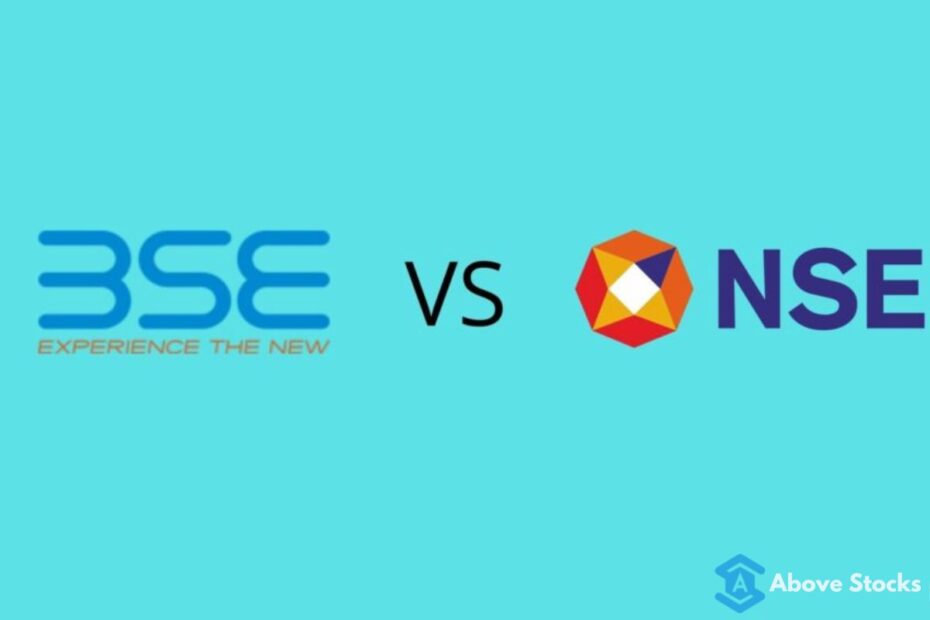Stock Exchange is a centralized platform where the shares of companies that trade publicly can be purchased or sold by participants. It is a great marketplace to facilitate the buy and sell of securities. The stock exchange is very systematic and well regulated with rules and procedures to allow fairness in trading. There are two major stock exchange markets in India – the Bombay Stock Exchange (BSE) and the National stock exchange (NSE).
Although both of them are major stock exchange markets in India, there is some fundamental difference between BSE and NSE.
Fundamental Difference Between NSE and BSE
1) BSE is the oldest stock exchange in Asia. It was established in 1875 in Dalal Street in Mumbai. NSE is a relatively newer stock exchange of India which was established in the year 1992 in Mumbai.
2) BSE has over 5000 companies listed with a market capitalization of over US$2.29 trillion as of March 2019. On the other hand, as it’s relatively new, NSE has over 1600 companies listed with a market capitalization of over US$2.27 trillion as of March 2019. It is one of the main difference between NSE and BSE
3) BSE globally ranks 10th whereas NSE has a ranking of 11th position in the global stock exchange ranking worldwide.
4) BSE launched Sensex in the year 1986 as the first index that was used to measure the overall performance of the stock market and provide top 30 trading companies in the exchange. NSE introduced Nifty as an equity benchmark index in India on April 21, 1996, to measure the overall performance of the stock market and provide top 50 trading companies in the exchange.

5) Apart from Sensex, other important indices of BSE are BSE 100, BSE 200, BSE 500, BSE SMALLCAP, BSE MIDCAP, BSE PSU, BSE Pharma, BSE Auto, etc. Apart from Nifty, other important indices of NSE are CNX 100, CNX Nifty Junior, S&P CNX 500, CNX Midcap, etc.
6) BSE is the oldest stock exchange had traditional methods for performing trading and settlement. NSE on the other hand was the first to start the fully automated advanced electronic trading system in India. Due to the electronic trading introduced by NSE, the time taken to perform trading and settlement is much less than the traditional method.
7) Due to the electronic method of trading and settlement, it brought a lot of ease in trading and attracted a lot of investors across India. As a result of this more trading happens in NSE compared to BSE. As a result of this volume of trading is less in BSE than NSE.
8) The overall value of shares traded during a certain period is more in NSE than BSE. Due to this the turnover and liquidity in the cash market of NSE are very high compared to BSE.
9) NSE established the first depository service in India called the NSDL (National Securities Depository Limited) in 1996. BSE provides depository services through the Central Depository Services Limited (CDSL) in 1998. These depositories hold securities in electronic form and undertake the process of clearing and settlement. These depositories have played a major role in reducing the settlement time from T+3 days to even T+1 for some products.
10) BSE facilitates the trading of Equity, Currencies, Debt instruments, Derivatives, and mutual funds whereas NSE facilitates the trading of Equity, Equity Derivatives, and debt and currency derivative segments on its platform.
Although these stock exchanges have a number of differences, both of them operate under the strict guidelines of SEBI (Securities and Exchange Board of India). They are both located in Mumbai but are globally recognized and open to investors all over the world.
Conclusion
So now that you are aware of the key differences between both the stock exchanges, you can choose and select the platform to buy and sell shares. NSE is suitable for investors who choose to involve in high volume volatile trading. For intraday traders, low trading volume in BSE is not suitable and hence NSE is suitable for intraday and swing traders.
BSE is more suitable for investors who are conservative to the risk and choose to hold for the long term. For investors who choose to invest once and wait for their investments to grow in due course of time, BSE is the ideal market place. For companies that are listed in only one exchange like NSE or BSE only, it is an obvious choice. However, for companies listed in both exchanges, it is completely based on the choice of the investor.
